BROOKTON — Fishing guide Lance Wheaton shook the ancient skillet full of sizzling fish fillets with his bare hand as Phil and Mary Anne Kadzielawski of North Carolina looked on in silence. The iron skillet from another century didn’t burn Wheaton, no more than the open fire he cooked over, moving his hands from pot to pan as he added salt to percolating coffee, boiling potatoes and fish caught just hours earlier on Baskahegan Lake.
For the grandmother and grandson fishing team who were guests at the meal, the entire adventure presented not only fresh, rich fare, but memories to last a lifetime.
“I knew I’d be hungry. But this is a whole experience,” said Phil Kadzielawski, 26, of Morrisville, North Carolina. “People spend thousands of dollars on cookware. He’s been using the same ones for decades. To think that skillet is from the 1800s.”
Registered Maine Guides across Maine help tourists and novice fishermen catch fish, as Wheaton helped the Kadzielawskis this day. But in few places are the fresh perch and smallmouth bass then cooked for lunch by the guides. Here in the Grand Lakes region the elaborate, yet primitive feast is no brown-bagged sandwich operation.
It involves logs used as a stove top, pots and pans as black as coal, and a whole lot of Maine woods know-how. And if you’re lucky, as the Kadzielawskis were on this weekday in July, the traditional shore lunch comes with calm water and blue-sky views of the quiet, undeveloped landscape that lies far Down East, near the Canadian border.
This remote banquet typically features white perch and smallmouth bass, fresh-baked bread and butter, boiled potatoes and onions, an added helping of pork chops or steak, and homemade blueberry pie from the heart of blueberry country. It’s a feast that feels and tastes like Thanksgiving at your grandparents, complete with stern orders to take seconds and thirds.
And the analogy is not far off.
The story of the shore lunch in Maine – elegant and old-fashioned as it is – has as much to do with family traditions as it does freshly caught fish. It’s a story about the most succulent fish fillets, the smoothest, richest camp coffee and the true essence of lake-to-table fare. But primarily it is about Maine families that date back generations, about fathers who pass on to their sons their campfire tricks, and about grandsons who proudly keep their grandfather’s fishing license from 1881.
It is a story as Maine as they come.
TRADITION THAT RUNS DEEP
As the group shared a meal together, Wheaton told stories about his father, Woodworth “Woodie” Wheaton, who was also a guide, and his father’s father, Arthur Wheaton, who instilled in his son a love of fishing and the outdoors. The real source of this shoreside meal was the generations of fishing guides who came before Lance Wheaton in the Grand Lakes region of Maine.
This remote corner of Washington County is made up of the 10,000-acre Big Lake, the 16,000-acre East Grand Lake, and the 14,000-acre West Grand Lake, as well as other large and pristine lakes. The fishing guides here, in their classic wooden green Grand Lake canoes (another product of the fishing culture here) consider cooking what you catch part and parcel of the fishing experience.
“That shore lunch has become a signature of the Grand Lakes region,” said Registered Maine Guide Tenley Bennett, who owns Fish River Lodge near Fort Kent. “Cooking what you catch is also a tradition in Aroostook County. But ours centers more on bear and moose.”
There are even some who believe the steep tradition of the shore lunch in this region began with Passamaquoddy Indians, who were the first guides to early European settlers.
“That makes sense. The guides who Thoreau hired were Native Americans. They knew the country,” said Don Kleiner, the executive director of the Maine Professional Guides Association. “The guiding tradition in Maine in general is really old. I am pretty certain we had the first guide license anywhere on the continent. (The Maine Legislature) started licensing guides in 1897. That has to be far ahead of anyone else.”
Even before that Arthur Wheaton from Grand Lake Stream was given a fishing license by the State of Maine in 1881, a document his grandson keeps carefully folded in his home.
A half-century later, Woodie Wheaton started guiding 1938. Then Lance followed his father, continuing the tradition for 52 years and counting.
“You couldn’t get a license until you were 18,” Lance Wheaton said. “Then, when you got a license you could go to work. So my father would say to me before that, ‘You know the lake don’t you?’ And he’d tell me to go guide but he’d tell the customers, ‘Don’t pay him, because he’s not a guide.'”
In Forest City, just feet from the Canadian border, Woodie Wheaton started Wheaton’s Lodge and taught his son, Lance, the tradition of the shore lunch, as Woodie learned it from his father. Lance and his wife, Georgie, started The Village Camps next door in 1969 and kept the tradition alive, exactly as it had been taught to them.
“What he serves in this pack basket, it is as close to the historic guide dinner as it can be,” said Georgie Wheaton, who bakes the pies, cookies and bread for the lunch.
Two years ago, after Lance had a heart attack, the Wheatons put their lodge up for sale. But even when the rustic, peaceful collection of small red cabins beside East Grand Lake sell, the Wheatons won’t leave. Lance Wheaton plans to build a house next door and keep on guiding.
“It’s my life. I’ll die in my canoe,” said Wheaton, 69, and he’s not kidding.
Arthur Wheaton died in his canoe while guiding. Then, 67 years after he served his first shore lunch, Woodie Wheaton died the day after guiding fishermen in the Grand Lakes region.
THANKSGIVING-STYLE
Standing in the lake up to his knees, Lance Wheaton sliced off the tail from white perch and smallmouth bass he and his customers caught the same morning. He peeled back the skin, before slicing a fillet from around the fish’s backbone in a matter of seconds.
“You don’t cut the head first. The head is your handle,” Wheaton said as he worked his knife swiftly.
Fish guts and parts fall into the lake, but Wheaton looked up to explain.
“The gulls will be here,” he said. “And if they’re not here, the eagles will eat it. And if they don’t, tonight the crayfish will eat it. So tomorrow there won’t be anything here.”
He then walked to his campfire a few feet from the water and fed the flames he had started with whittled-down wood splints. He balanced a tree branch he had just cut to serve as the pole on which to hang the potato pot. And like the expert multi-tasker he is, Wheaton chopped the potatoes and onions on a pine slab table in his favorite outdoor kitchen.
Like everything else heating on the open fire, these side dishes are not ordained with spices. Slathered in butter, salt and pepper once they turn soft and hot, they’ll be just fine by Wheaton’s estimation. That’s his general approach to cooking. But here it proved right.
“When you are catching fish from water you can drink, chances are there’s not much wrong with it,” Wheaton said after throwing only a bit of cornmeal on the fish.
As he passed the first batch of fillets around the table, he poked gentle fun at Mary Anne Kadzielawski for her hearty appetite, as she savored each one.
“This is Phil’s first experience. Now he’ll be back next year,” she said at the end of her third year of sharing in the shore lunch tradition. “He was so excited for this he couldn’t wait for yesterday to be over and to get to today.”
Once the fish, pork chops, potatoes, onions, pickles and home-baked bread had been passed two or three times around the picnic table, the food was nearly gone. Wheaton’s guests cleaned their plates just as the coffee arrived.
Guide coffee, as its known in these parts, is prepared a certain way. Today some younger guides simplify the process. Lance Wheaton learned it right from his father.
Water is boiled on the open fire, then ground coffee is added, along with an egg and dash of salt. The egg holds the grounds together, and as the boiling water percolates, it brews the coffee.
“And darn if it’s not good coffee,” Mary Anne Kadzielawski said.
Wheaton perfected his guide coffee cooking for an army of 250 men, quite literally, when he served in the U.S. Army in 1965 as a cook.
He set the large black, metal coffee pot to the side of the fire, rather than on it, as he did with the frying pan. The trick is to pull the grounds, now stuck to the egg, to the side, so that when he pours the coffee, his clients do not sip the grounds.
“It acts like a percolator,” Wheaton said, satisfied, watching the coffee pot he set on a log.
It arrived just in time for the blueberry pie, which Wheaton dished out in huge slices as creamy as ice cream.
“Georgie bakes cookies every other day, pies every day and bread every day,” Wheaton said. “I couldn’t do it without her. It’s a team effort.”
After the last piece of pie was set before one of four guests, Wheaton produced two plastic red Folgers coffee bins, and without a word nodded to the group to pass these around.
This was not a cookie day in the Wheaton household. But as if to celebrate the tradition of this century-old feast on this pine-tree peninsula in the middle of nowhere, it just became one.
A SPECIAL CORNER OF THE STATE
Shore lunches are not unique to Maine. Fishing guides in Canada and out West also are known to grill up a freshly caught fish. But like all things today, the tradition has diminished.
“This tradition is not as widespread as it once was, although still pretty common in that area and the far north,” said Kleiner of the Down East region and Aroostook County.
In the Grand Lakes region, which boasts the largest concentrations of guides than any other part of Maine, the shore lunch remains a part of the landscape. That’s in part because guides here have access to fire-permitted lunch sites through land trusts. And they refuse to part with the tradition.
Elsewhere, younger guides are trading the old shore lunch tradition for the convenience of packed lunches or shorter trips that don’t allow for such elaborate fare. Not in Washington County.
A pass across Baskahegan Lake, where boats are scarce and miles of undeveloped shoreline are plentiful, a small clearing reveals another green canoe pulled ashore. There, tucked among the pines, another Grand Lakes guide is building a campfire, boiling potatoes, and telling fish stories as one more century-old ritual plays out. And chances are, it won’t be the last time.
Copy the Story LinkSend questions/comments to the editors.


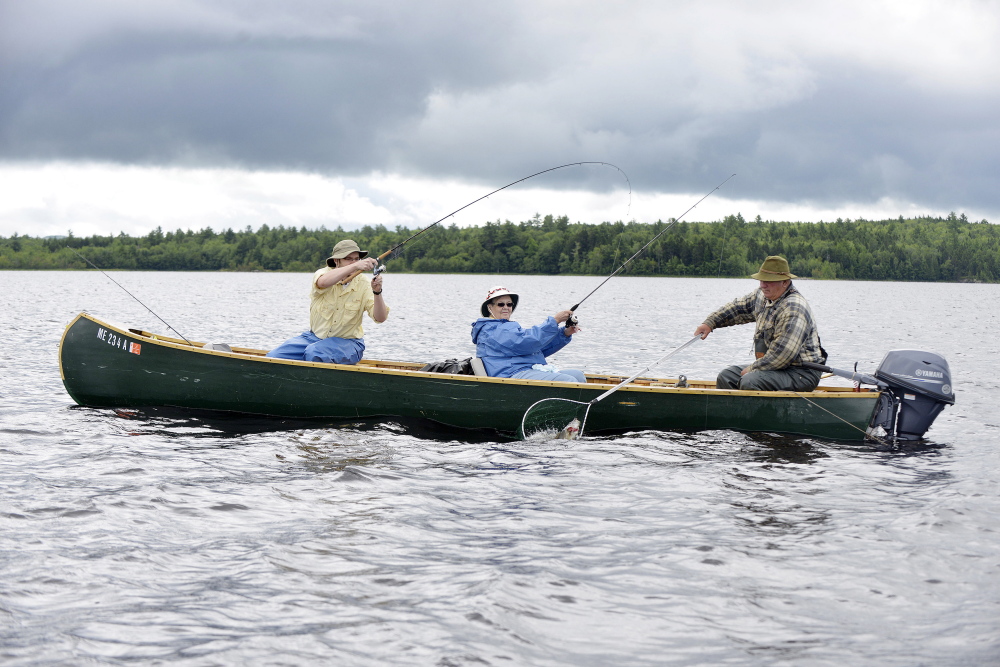
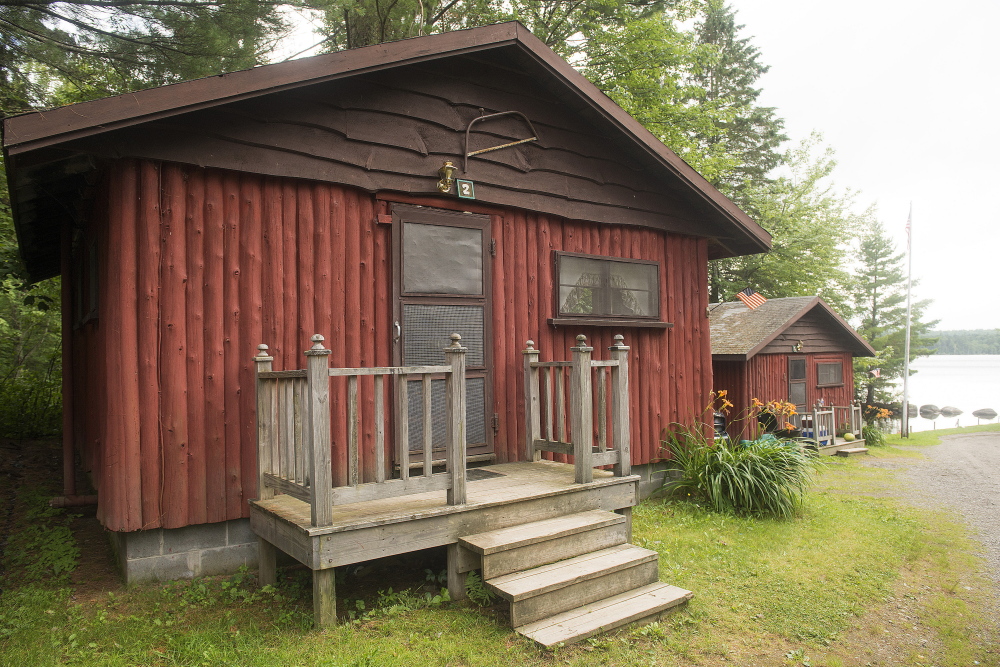
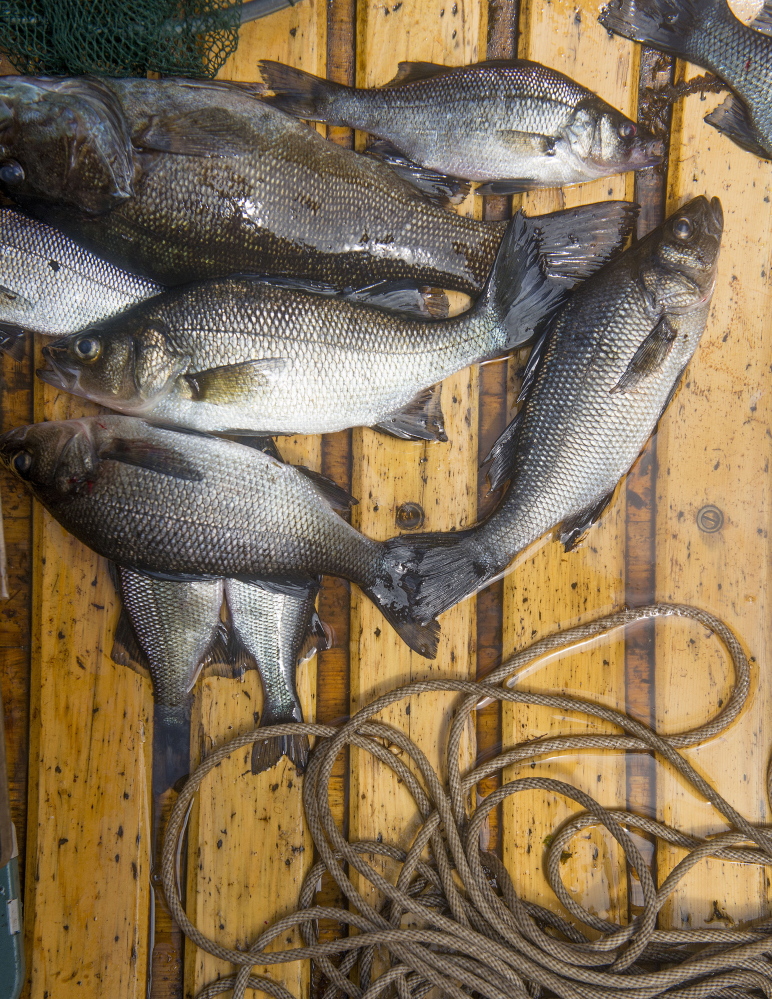
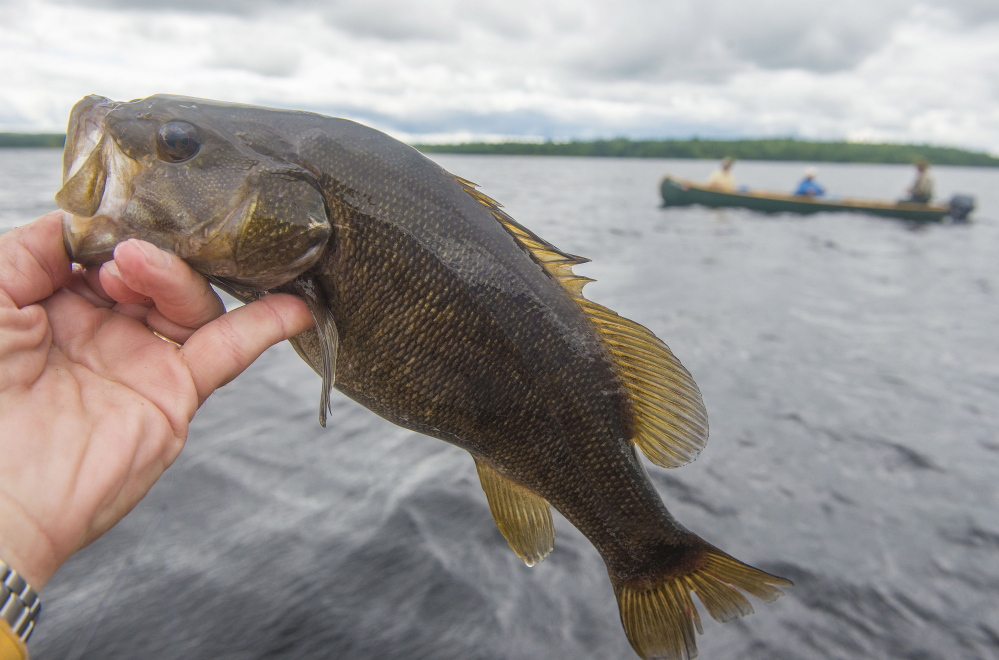
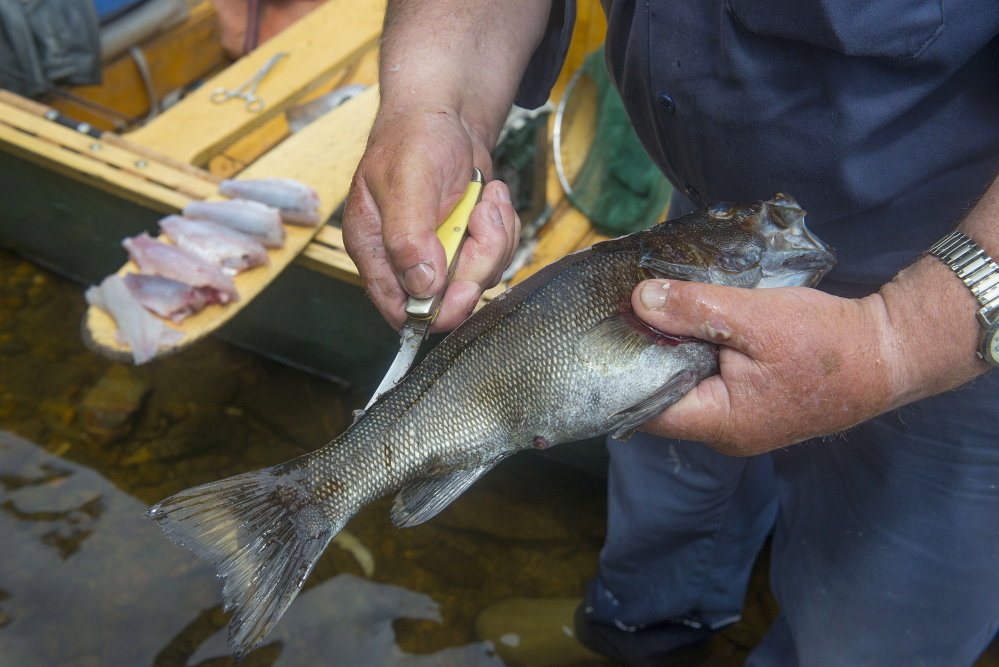

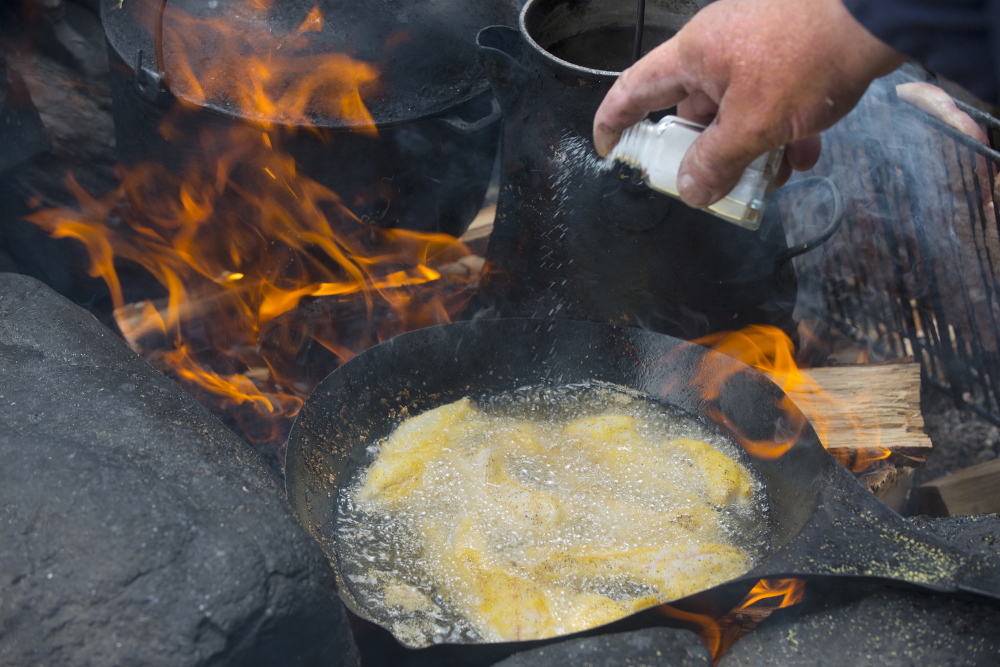
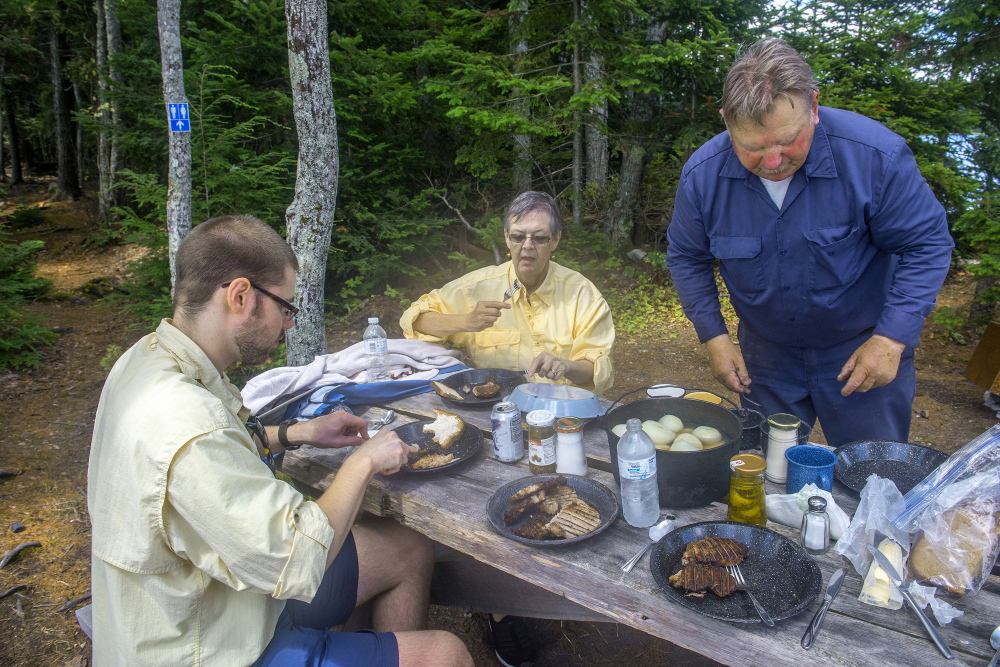
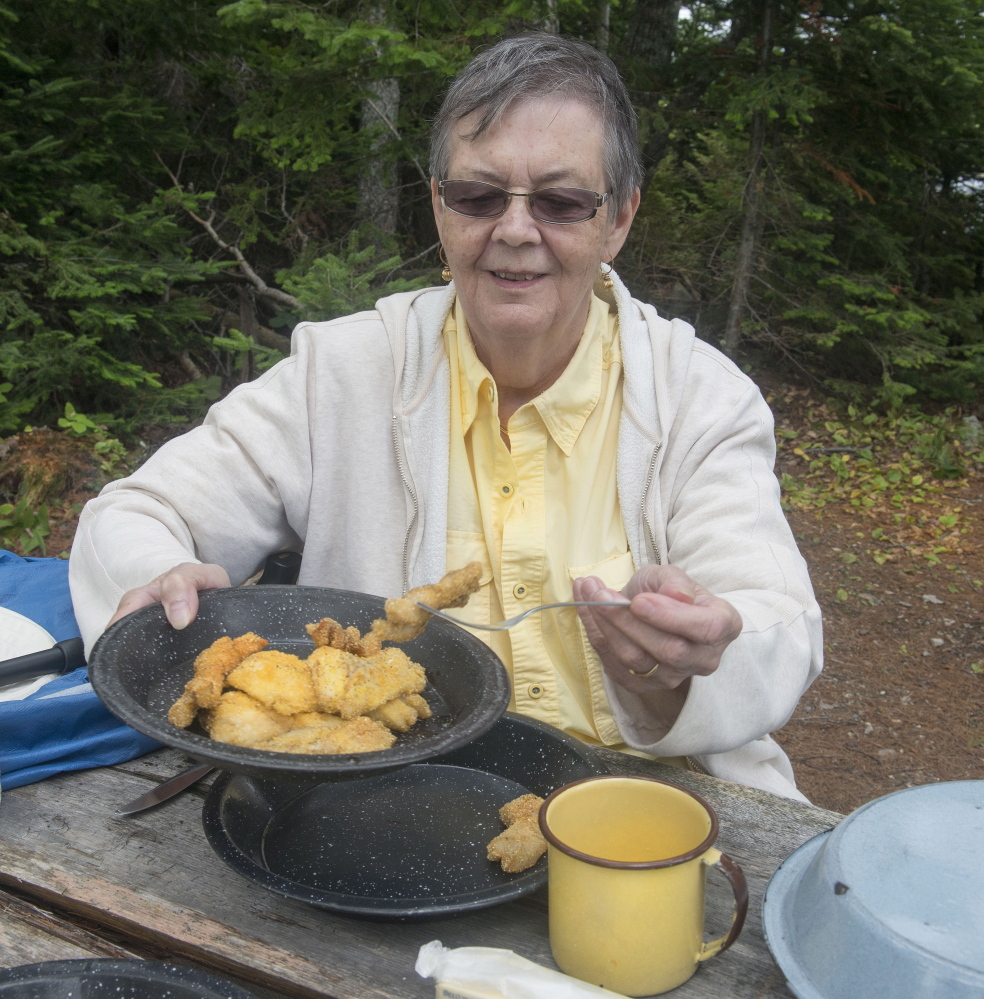
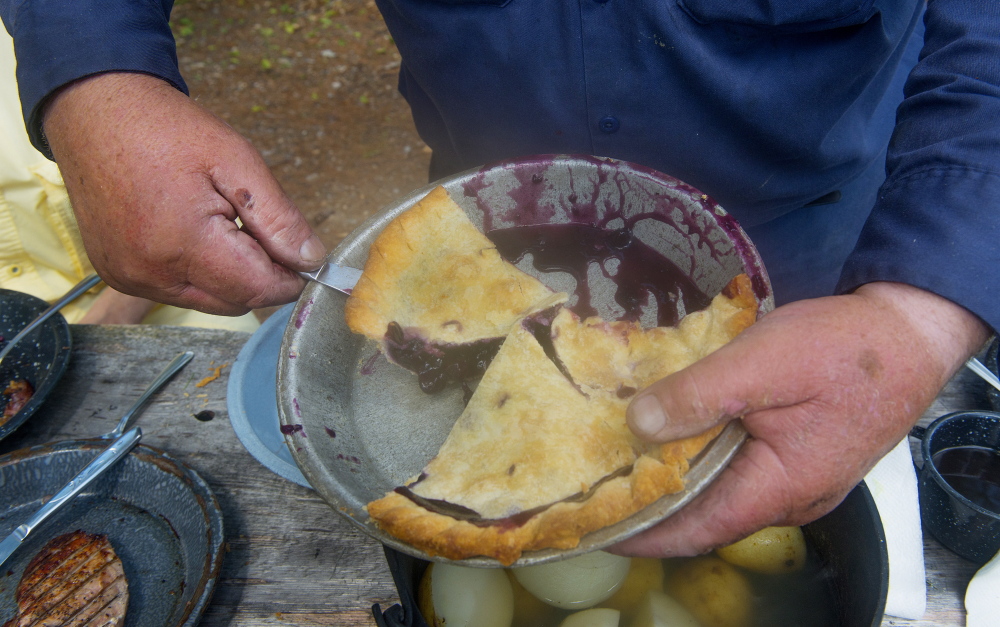

Success. Please wait for the page to reload. If the page does not reload within 5 seconds, please refresh the page.
Enter your email and password to access comments.
Hi, to comment on stories you must . This profile is in addition to your subscription and website login.
Already have a commenting profile? .
Invalid username/password.
Please check your email to confirm and complete your registration.
Only subscribers are eligible to post comments. Please subscribe or login first for digital access. Here’s why.
Use the form below to reset your password. When you've submitted your account email, we will send an email with a reset code.